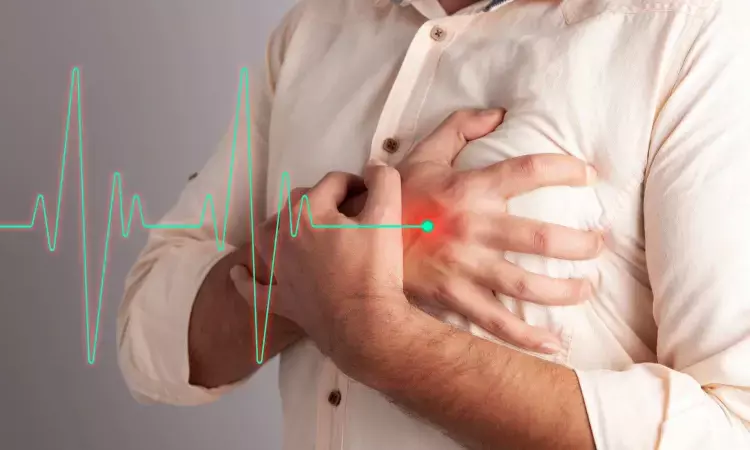- Home
- Medical news & Guidelines
- Anesthesiology
- Cardiology and CTVS
- Critical Care
- Dentistry
- Dermatology
- Diabetes and Endocrinology
- ENT
- Gastroenterology
- Medicine
- Nephrology
- Neurology
- Obstretics-Gynaecology
- Oncology
- Ophthalmology
- Orthopaedics
- Pediatrics-Neonatology
- Psychiatry
- Pulmonology
- Radiology
- Surgery
- Urology
- Laboratory Medicine
- Diet
- Nursing
- Paramedical
- Physiotherapy
- Health news
- Fact Check
- Bone Health Fact Check
- Brain Health Fact Check
- Cancer Related Fact Check
- Child Care Fact Check
- Dental and oral health fact check
- Diabetes and metabolic health fact check
- Diet and Nutrition Fact Check
- Eye and ENT Care Fact Check
- Fitness fact check
- Gut health fact check
- Heart health fact check
- Kidney health fact check
- Medical education fact check
- Men's health fact check
- Respiratory fact check
- Skin and hair care fact check
- Vaccine and Immunization fact check
- Women's health fact check
- AYUSH
- State News
- Andaman and Nicobar Islands
- Andhra Pradesh
- Arunachal Pradesh
- Assam
- Bihar
- Chandigarh
- Chattisgarh
- Dadra and Nagar Haveli
- Daman and Diu
- Delhi
- Goa
- Gujarat
- Haryana
- Himachal Pradesh
- Jammu & Kashmir
- Jharkhand
- Karnataka
- Kerala
- Ladakh
- Lakshadweep
- Madhya Pradesh
- Maharashtra
- Manipur
- Meghalaya
- Mizoram
- Nagaland
- Odisha
- Puducherry
- Punjab
- Rajasthan
- Sikkim
- Tamil Nadu
- Telangana
- Tripura
- Uttar Pradesh
- Uttrakhand
- West Bengal
- Medical Education
- Industry
Natriuresis-guided diuretic therapy improves diuresis and natriuresis in patients with heart failure

Netherlands: A recent study published in Nature Medicine suggests that natriuresis-guided therapy could be a first step toward personalized treatment of acute heart failure (AHF).
In PUSH-AHF, natriuresis-guided diuretic therapy AHF patients led to significant improvement of natriuresis and diuresis up to 48 h without affecting HF hospitalization and/or all-cause mortality at 180 days.
The researchers noted several other key findings that should be considered in results interpretation. First, in the natriuresis-guided treatment group, diuretic therapy intensification occurred in the majority of patients, resulting in the administration of substantially higher doses of loop diuretics. Second, the urinary sodium-based diuretic treatment was safe and did not lead to electrolyte or renal perturbations despite the use of much higher cumulative loop diuretic doses. Third, the consistent effect of natriuresis-guided therapy on 24 h natriuresis across a broad spectrum of patients reflects a contemporary, all-comer, AHF population.
"The results of PUSH-AHF provide the first randomized evidence supporting natriuresis-guided therapy use to improve natriuresis in patients with acute heart failure," the researchers wrote.
Natriuresis measurement has been suggested as an easily obtainable, reliable biomarker for assessing the response to diuretic treatment in AHF patients. Jozine M. ter Maaten, University of Groningen, Groningen, the Netherlands, and colleagues assessed whether natriuresis-guided diuretic therapy improves clinical outcomes and natriuresis in AHF patients.
For this purpose, they conducted the open-label, pragmatic Urinary Sodium-based algoritHm in Acute Heart Failure trial, which included 310 patients with AHF requiring treatment of IV loop diuretics. They were randomly assigned to natriuresis-guided therapy or standard of care (SOC).
In the natriuresis-guided arm, natriuresis was determined at set time points, prompting treatment intensification if spot urinary sodium levels were <70 mmol l−1. The dual primary endpoints included 24-hour urinary sodium excretion and a combined endpoint of time to all-cause mortality or adjudicated heart failure rehospitalization at 180 days.
Key findings include:
- The first primary endpoint was met, as natriuresis in the natriuresis-guided and SOC arms was 409 ± 178 mmol arm versus 345 ± 202 mmol, respectively.
- There were no significant differences between the two arms for the combined endpoint of time to all-cause mortality or first heart failure rehospitalization, which occurred in 31% and 31% of patients in the natriuresis-guided and SOC arms, respectively (hazard ratio 0.92).
An important observation from the PUSH-AHF trial is that natriuresis-guided diuretic therapy was safe and did not lead to more (serious) adverse events or prespecified renal events.
"The PUSH-AHF study provides a first step towards a personalized natriuresis-guided approach in patients with AHF," the investigators concluded.
Reference:
Ter Maaten, J. M., Beldhuis, I. E., Krikken, J. A., Postmus, D., Coster, J. E., Nieuwland, W., Van Veldhuisen, D. J., Voors, A. A., & Damman, K. (2023). Natriuresis-guided diuretic therapy in acute heart failure: A pragmatic randomized trial. Nature Medicine, 1-8. https://doi.org/10.1038/s41591-023-02532-z
Dr Kamal Kant Kohli-MBBS, DTCD- a chest specialist with more than 30 years of practice and a flair for writing clinical articles, Dr Kamal Kant Kohli joined Medical Dialogues as a Chief Editor of Medical News. Besides writing articles, as an editor, he proofreads and verifies all the medical content published on Medical Dialogues including those coming from journals, studies,medical conferences,guidelines etc. Email: drkohli@medicaldialogues.in. Contact no. 011-43720751


